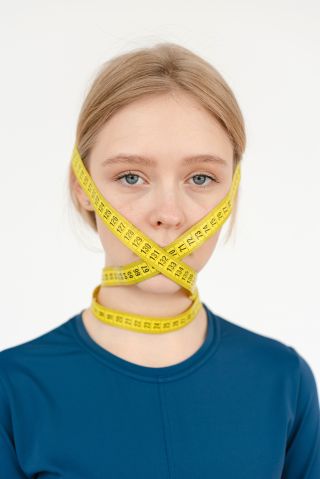OCD
What’s It Like to Be a Teen Living With OCD?
OCD can be extreme and require support to heal. A view from the inside.
Posted March 7, 2023 Reviewed by Tyler Woods
Key points
- Teens with OCD can experience urgent, catastrophic obsessions that disrupt sleep, prevent eating, and lead to overwhelming despair.
- Disclosing one's struggles, seeking care from specialized psychotherapists, and going easy on oneself are the first steps toward equilibrium.
- Considerable improvement is needed in the strategies hospitals use to work with teens in crisis with OCD.
- Exposure and Response Prevention (ERP) and Acceptance and Commitment Therapy (ACT) are consistently successful in treating teens with OCD.
In this blog post, I interview Simone E., a 13-year-old living in Northern California diagnosed with OCD in September of last year and hospitalized. During her time in the hospital with other teens and in out-patient treatment afterwards, she worked with professionals and with herself to understand and improve her mental health. As she was recovering her equilibrium, she published an article in a local magazine relating her experiences with OCD and her observations about mental health. She is currently in treatment for OCD, while also going to public school. I talked to her this past month to gain first-hand insight about the experience of being a teen with OCD.
The Interview
Robert Kraft: You were hospitalized for OCD. What symptoms led you to go into the hospital?
Simone E.: The main symptom was a repetitive obsession that “made me” watch videos online that I found incredibly scary. This thought cycle had been worsening for weeks, to the point where I was thinking about it every moment of the day, not eating (because my stomach was too nervous and I lost my appetite) and not sleeping at all. Eventually, I completely lost all hope that the obsession would go away.
I was checked into the ER because I had not eaten in a week and because I attempted to self-harm. The obsession I remember most clearly was, “You have to watch the videos again or else. Or else you will be thinking about it for the rest of your life.” My mind also told me, “they’re not going to be able to help you,” since I had already gone through treatment for standard anxiety. At that time, I didn’t know I had OCD.

RK: You published an article in a local magazine about your experience with OCD. What were your reasons for going public?
SE: I realized that other people like me have horrible OCD and they don’t know it because they've been misunderstood or misdiagnosed and given the wrong treatment. I wanted to tell my story because suffering from OCD has been the worst experience of my life, and I knew if I could help even just one person, that would be a worthwhile contribution.
Far too often, OCD is misdiagnosed as anxiety if there are no observable compulsions, such as washing hands. I wanted people to know that OCD can be completely internal.
One difference between OCD and anxiety is that OCD feels incredibly urgent and the person suffering cannot be distracted until they do what they feel they need to do, and the thoughts always come back stronger after the compulsion. Another main difference with OCD is that the thoughts are often more unusual and specific than common anxious thoughts. A person diagnosed with anxiety may worry about school or friends, while a person with OCD may worry about their mom being dead if she walks over a bridge or about a particular person being contaminated because her grandmother has cancer.
RK: What advice do you have for parents and other adults who want to help?

SE: To start, you can be supportive by listening and not dismissing the obsessions as a temporary phase that we will pass through. And always remember, to the child or teen, these obsessions can feel as urgent as a car crash, even though they are only inside our head.
RK: What advice do you have for children and teens with OCD?
SE: I’m still learning how to cope with my OCD, but I do have some general advice.
Tell adults you trust what's bothering you. I say this because I know it can be hard to share these things. But that’s the first step in getting the help you need. It may seem like the world is ending, but once you get the necessary help, it feels so much better. And always remember to be easy on yourself, which I also need to learn. That’s more difficult than it sounds, but it’s essential.
RK: What changes are necessary when treating a teen in crisis with OCD?

SE: Something absolutely huge in this realm is how unhelpful mental hospitals are. Having been admitted two separate times, I cannot stress this enough. In the hospital, there were no treatments except group therapy (nobody talks) and forced medication. A girl was having a panic attack in the hallway, and the staff refused to let us talk to her. “We’ll just get you an Ativan,” the nurse said. Another patient was forced to take a shot of Haloperidol, which can be dangerous. And this sort of thing is often done without the consent of the patient's parents.
I have so much trauma about feeling alone and hopeless. Unless you have a roommate, the only people coming in your room are the nurses who give you medication. (And for me, twice it was the wrong medicine.) I may sound extreme, but we absolutely need to improve hospital care.
RK: What changes would you like to see in society’s influence on mental health problems?
SE: We need more therapy covered under insurance. I know a lot of people who’ve only had one therapy session because of a lack of money, or people who can see a therapist only once a month.
I’m glad medication is an option, but in-person therapy is essential in mental health and cannot be replaced by a pill.
RK: Since you’ve begun treatment for OCD, what have been the most helpful experiences for you?
SE: So much has been helpful, and what really summarizes it is a workbook called The ACT Workbook for Teens with OCD by Patricia Zurita Ona. I’ve been getting treatment at her center, and I would go so far as to say it saved my life—because quite literally it did. ERP combined with ACT has worked so well for every obsession and compulsion. Ultimately, the diagnosis will never matter as much as the treatment.
Successful Treatments Defined

ACT is Acceptance and Commitment Therapy, a mindfulness-based, action-oriented psychotherapy. Exposure and Response Prevention (ERP) directly addresses the two maladaptive connections that characterize OCD: 1) The connection between distressing thoughts and the situations that produce serious anxiety and 2) the connection between compulsive, ritualistic behaviors and decreasing the anxiety. Based on his comprehensive study, Jonathan Abramowitz concluded, “The psychological treatment of obsessive–compulsive disorder (OCD) with exposure and response prevention (ERP) methods is one of the great success stories within the field of mental health.”
To find a therapist near you, visit the Psychology Today Therapy Directory.
References
Abramowitz, J.S. (2006). The Psychological Treatment of Obsessive–Compulsive Disorder. Canadian Journal of Psychiatry. Volume 51:407–416. The PDF is https://journals.sagepub.com/doi/pdf/10.1177/070674370605100702




